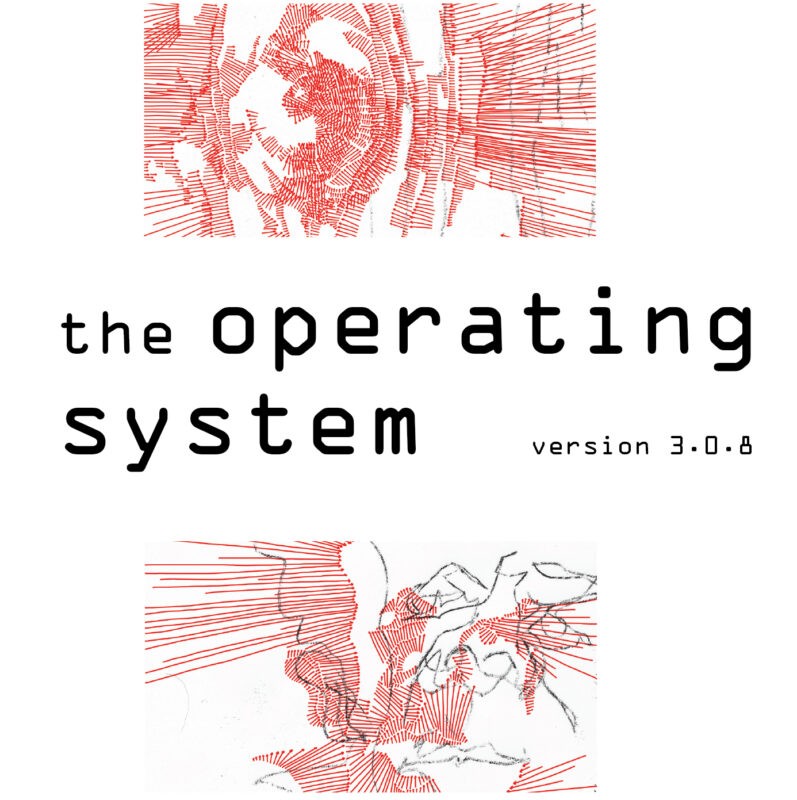The Operating System is a radical, open source, queer/TGNC run arts organization with an archive-and-access-facing publication program dedicating to amplifying and exhuming innovative creative and critical projects. Our projects focus on underrepresented voices, mixed-genre, avant-garde, and politically critical work, as well as on infrastructure building, open source resource development and dissemination, and archival documentation across creative disciplines. For the Zine Library http://flipsnack.com/glitterbomb
We have produced over 100 print:documents on a creative commons license (also available as open access PDF’s) since our first print:document series of four titles in 2013, and hosted hundreds of events in cities across the US. Our goal is to not only build but model and facilitate sustainable, horizontal organizational strategy that is both replicable and scalable for creative practitioners everywhere.
Liminal Lab is an agile, all-access, experimental platform for anti-hierarchical, decolonial, peer to peer learning across disciplines, as well as a hub for resource sharing, performance, and collaboration. It is a project conceived of and managed by Elæ under the umbrella of the OS, with feedback loops from and in partnership with a rapidly growing pantheon of visionary facilitators and partner organizations. Looking ahead at not only this year but the fallout in the years to come, Liminal Lab is designed with system sustainability, scalability, and long-term mutual aid for the most vulnerable in mind, as well as offering a model wherein we question WHO gets to learn, WHAT we learn, HOW we learn, WHERE we learn, and the value assigned to these.
Featured
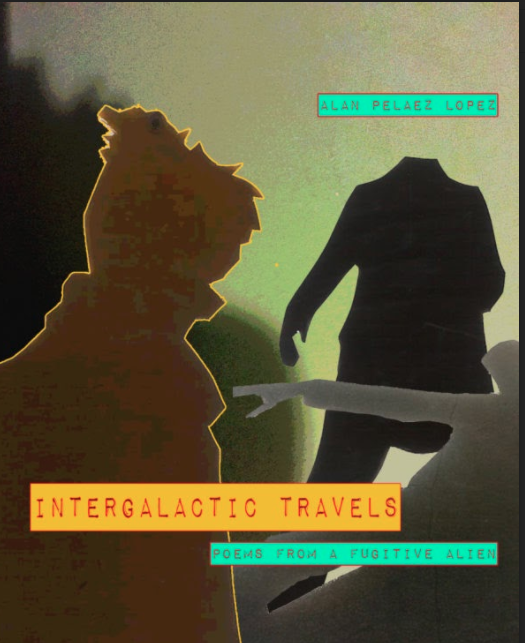
Intergalactic Travels
[A Kind* Texts & Projects Title]
“‘Intergalactic Travels: poems from a fugitive alien’ brilliantly expands the conversation on undocumented migration by tracing the legacy of illegality. Claiming ‘every crossing becomes mine, ‘ Alan Pelaez Lopez, as fugitive alien, bravely takes on the task of traveling across galaxies to reach an elsewhere that is something more like a new holding. Against the failure of political language, this book of multimedia poems becomes a verb, an active imagining that takes the banality of papers and transforms it into poetry. This intergalactic traveling brings the ‘Black NDN’ migrant touchingly back to their mother’s arms, and to her vision for life. If illegality is to be their legacy, Alan reimagines that illegality as both disruptive of settler-futures and productive for black and indigenous futures. We should be immensely grateful for this vision.” –Javier O. Huerta, author of ‘American Copia: An Immigrant Epic’
“This is a stunning book. It’s history, it’s their story, it’s an archive and a hard drive with a playful vibe. Its sense of humor girds and grounds and gallops around the gravity of law and belonging and erasure and choosing words and narratives and modes that were made without people like us in the room. It revels in colonial language as it tells that language to sit the f down. There’s a new b on the scene. Take note and pay your respects.” –Tommy Pico, author of ‘Feed’
Intergalactic Travels: poems from a fugitive alien is an experimental poetry collection that renders an intimate portrait of growing up undocumented in the United States. Through the use of collages, photographs, emails, and immigration forms, Alan Pelaez Lopez formulates theories of fugitivity that position the Trans*Atlantic slave trade and Indigenous dispossession as root causes of undocumented immigration. Although themes of isolation and unbelonging are at the forefront of the book, the poet doesn’t see belonging to U.S. society as a liberatory practice. Instead, Pelaez Lopez urges readers to question their inheritance and acceptance of “settler rage, settler fear, and settler citizenship,” so that they can actively address their participation in everyday violences that often go unnoticed. As the title invokes, Intergalactic Travels breaks open a new galaxy where artists of color are the warriors that manifest the change that is needed not only to survive, but thrive.
Fugitivity, Sequestration, and Escape: Tactics in the Realm of Language – an OS Interview with Alan Pelaez Lopez
when the doors open, I can’t see the path – an excerpt from Intergalactic Travels – poems from a fugitive alien on the OS’s [RE:CON]CRETIONS series
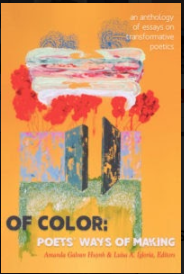
Of Color: Poets’ Ways of Making
contributions from Mai Der Vang (Foreword), Ching-In Chen, Addie Tsai, Tony Robles, Wendy Gaudin, Ernesto L. Abeytia, Abigail Licad, Tim Seibles, Melissa Coss Aquino, Sasha Pimentel, Jose Angel Araguz, Khadijah Queen, Remica L. Bingham-Risher, Ocean Vuong, Craig Santos Perez, and Kenji Liu.
How do poets of color come to know what they do about their art and practice? How do they learn from and teach others? For poets of color, what does the relationship of “what one knows” have, with conditions extending but not limited to publishing, mentorship and pedagogy, comradeship and collegiality, friendship, love, and possibility? Is one a real poet if one does not have an MFA? For minority poets not considered part of the mainstream because of the combined effects of their ethnic, class, racial, cultural, linguistic, and other identities, what should change in order to accord them the space and respect they deserve? How best can they discuss with and pass on what they have learned to others?
These and other questions come up so consistently in our daily experience as poets of color. And we hear them from poets of color at various stages of their careers. Out of the desire not only to hear from each other but also to share what we’ve learned–each from our unique as well as bonded experiences of writing as poets of color in this milieu–this anthology project was born.
In this collection, we make no claims of presenting any definitive theoretical or other stance. Neither do we offer these essays as prescriptive of certain ways of thinking of craft or of doing things, although in them is expressed a collective wish–that writers of color find ways to gain strength and visibility without replicating the systems that play the game of divide and conquer and turn us against each other for narrow or self-serving profit. Instead, let there be a steady effort to compile lore and take inventory of strategies, intersections, bridges; to map our histories, to sight possibilities for the future.
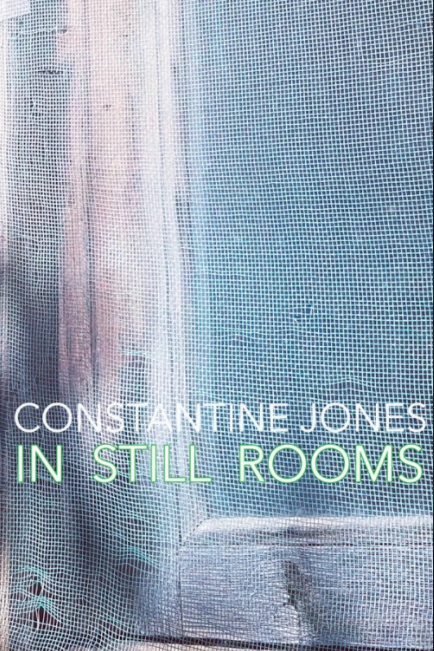
In Still Rooms
In Still Rooms is more than a haunted house novel–a strange hybrid drawing its aesthetic equally from ancient Greek drama, ecopoetics, and the Gothic tradition. Set in an old house in rural East Tennessee, three generations of a Greek-American family mourn the loss of a matriarch who reveals herself to each of them uniquely. Regardless of the family’s comings and goings, the reader remains always in the house. In this house, religion, mythology, and superstition all rule equally. In this house, saints speak to mothers from their plaques on the wall; ancient deities manifest in the minds of children; a Chorus of those who have previously died there address the reader directly; and ultimately, the house itself begins to speak.
“Constantine Jones is a prophet for our times. Their writing contains truths, ghosts, gods, love, the unknown, the past, the present, and the future. “But it’s alright every now and again,” the narrator says, which is a constant theme throughout the book, showcasing that life is neither one thing or the other, but gradient of everything. How do the characters react? This book is a case study in humans and how they act in all times, with grief and love and loss. Families, family identity in America, and how families function and dysfunction is such a crucial part of our everyday lives, and for the lives of Greek Americans and Greek American immigrants. This is a wonderful look into that world, both familial and religious, and examines the roles all family members fall into, and perhaps, out of, fluidly and not so fluidly.”–Joanna C. Valente, author of Marys of the Sea and editor of A Shadow Map: Writing by Survivors of Sexual Assault
“Misted by the East Tennessee mountains, the house at the center of In Still Rooms echoes with the fading words of a family’s Greek heritage and the unsteady steps of two siblings trying to edge out into the world. Bereft of their Greek-American matriarch, Eleni and her twin brother Evan must put their own specters to bed and venture into their own possibilities. Their house becomes an intimate amphitheater of memory and discovery. Written in lovingly evocative and poetic prose, and animated by a sharp-edged chorus of Southern ghosts as well as the ultimate voice of the house itself, Constantine Jones’s beautiful debut novel gives us a story infused with the power of mythic places past and present, ancient and American.”–David Groff, author of Clay and Theory of Devolution
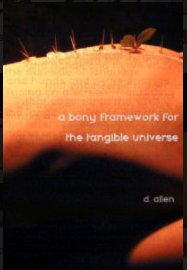
A Bony Framework for the Tangible Universe
[A Kind* Texts & Projects Title]
“What occasions assembling a new body? Is language even sufficient for this task or does it always demonstrate its own body-forming shortcomings? So much literature from marginalized spaces has contended with these question. In A Bony Framework for the Tangible Universe, poet and multimedia artist D. Allen finds their voice among erasures from dictionary definitions, lyrical polyphony, the urgency of second person, and the tug-of-wars between rural and urban spaces for people with disabilities to ritualize gestures of survival in sites arrowed with pain, destruction, surveillance, and control. Allen offers us their own visual productions–with echoes of Joseph Cornell’s boxes–and assembles centos on the page to find the “knife” in all of us and to ask what it’s there to do. “To inhabit a body with secrets welded inside every cell is to live in a place without learning its landscape,” they write, evoking how living with disability can be a constant process of (re)orientation, (re)acquaintanceship, and (re)fermentation. What does the disabled body want today that it couldn’t foresee wanting last week? Is the disabled body the impetus for a new metaphysical world? As Allen has sewn this collection, I too have lived with these poems. I’ve watched them become what you, necessary reader, hold before you. I hope they offer you the same resoluteness they’ve offered me.” –Roy G. Guzmán, poet and author of Restored Mural for Orlando
“A Bony Framework for the Tangible Universe is one of the most necessary books I’ve ever encountered. The speaker’s experience of disability–burning, light, love, and everything else–covers the body like a new skin. The breathtaking visual elements scaffolding the work are its bones, and with each new line we are reminded: ‘Bless these sensations more tenacious than pain.'” –Nicole Oquendo, multimodal writer and visual artist
A Bony Framework for the Tangible Universe is a hybrid collection of lyric essays, poems, dictionary erasures, and images that emerged out of the poet’s diagnosis, in their mid-twenties, with a connective tissue disorder. Slipping in and out of intimate interiors, open fields, city sidewalks, flowering gardens, construction sites, doctor’s offices, and fluctuating shorelines, the speaker gathers answers to the question: What holds us together when the body falls apart? Imperfect solutions arrive in the form of queer intimacy and kinship, long-term relationships with landscapes, collections of strange and familiar objects, and language itself. A Bony Framework for the Tangible Universe is constantly breaking and and putting itself together in a messy cycle of adaptation and resistance.
Wholeness through Hybridity – An OS interview with D Allen
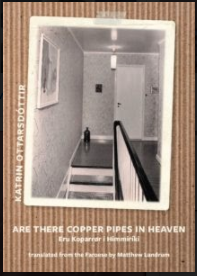
Are There Copper Pipes In Heaven / Eru Koparrør Í Himmiríki
Faroese is a traditionally repressed language though it has made great strides since gaining semi-autonomy from Denmark after WWII. For several decades, Katrin Ottarsdóttir — a pioneer in Faroese filmmaking and poet — has been making work across disciplines, committed to breaking this silence in defiance of the secretive culture in the Faroe Islands that demands it.
Ottarsdóttir’s groundbreaking, award-winning 1999 film, Bye, Bye, Bluebird was the first feature film made in the Faroese language; to date she has made several documentaries, shorts etc., as well as two more award-winning feature films: Atlantic Rhapsody (1989), and Ludo (2014). Ottarsdóttir has since gone on to write two books of poetry. The first, now forthcoming from the Operating System in a rare dual-language translation including the Faroese, is Are there Copper Pipes in Heaven, an autobiographical account of her abusive mother’s drug use and eventual suicide. This book was the first Faroese collection of confessional poetry and was highly controversial in a society that does not make public such personal topics, yet despite this it was awarded the Faroese Litterature Award in 2013. (Her film, Ludo, explores the same material.) In 2015 Ottarsdóttir published the poetry collection Mass For A Film, and in 2016 a collection of short stories, After Before.
Breaking Open the Side of the House: A Conversation with Translator Matthew Landrum
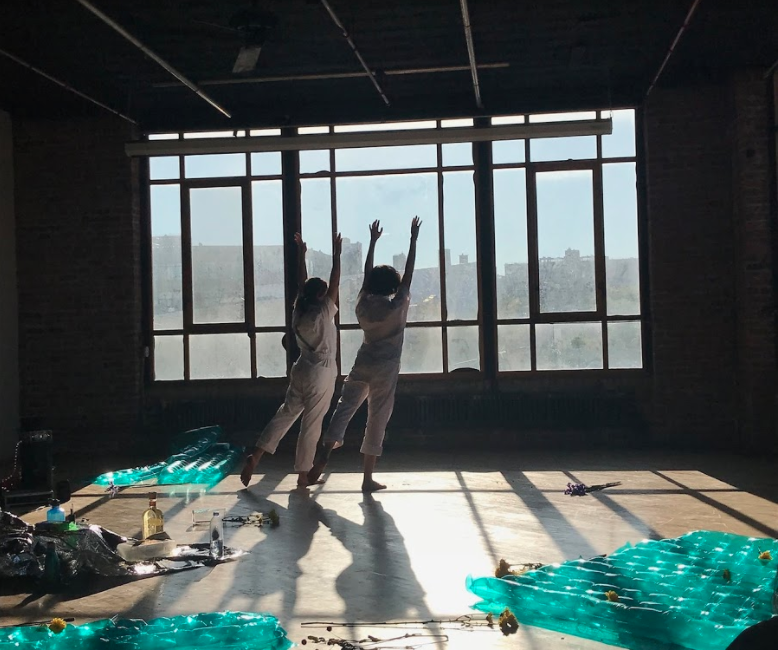
Collaborative Precarity Bodyhacking: Work-Book & Resource Guide –
Collaborative Precarity Bodyhacking was a series of cross-disciplinary workshops facilitated by ELÆ (Lynne DeSilva-Johnson), marion storm, & Cory Tamler in conjunction with the Resistance Fantasies residency of The Exponential Festival.
These workshops and this accompanying workbook address precarity’s trauma-resonant effects on mind and body programming. These intensive gatherings will employ individual and group work that includes writing, performance, movement, breath work, mindfulness, and dialogue. We will make space for reading, ritual, and emergent documentation. No previous experience in any of these disciplines is necessary, and exercises will be adaptable to the needs and abilities of different bodies. The workbook is full of resources, scores, and annotations for further research based on these workshops.
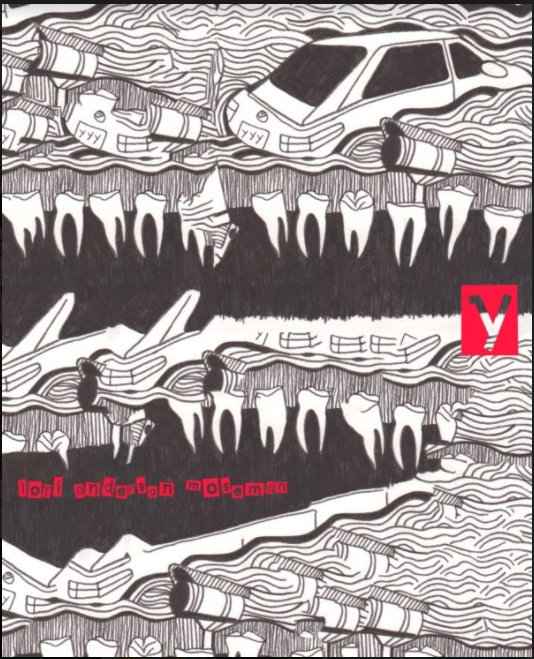
Y
Much like you, Y is a catalyst — an indeterminate variable active in cultural production. A collective organism in the waste stream, Y bemoans their leaching marrow, tries strengthening their aging spine with a hula hoop. In grocery stores, in art galleries, at dentist offices and fuel transfer stations, Y hoops to lament, invent and foment. Y’s looping traces analogy-n-ratio as if relation were the life-blood linking bodies to orbits. Y wants to impeach.
Jaw gyrates. Hips open. Round and round, Y circumscribes the body politic in a kind of agitprop theatre that protests POTUS, pipelines, and spies. Trying to energize and not terrorize, Y gathers beloveds to fight for food justice, for safe environs. As a printed matter, the book Y is the textual residue of labor and play. A curious body holds, twists, then bounces a prop. Y calls these “poems” or “stories” a “somatic trick.” In sum, Y’s sonic practice is an interspecies interaction created to cope with the year 2017 — its corpses and bar codes. Y is a little free speech corral.
Indeterminate Variables in the Face of Danger – an OS interview with Lori Anderson Moseman
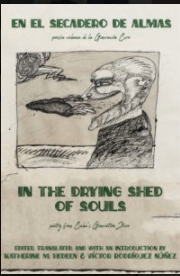
In the Drying Shed of Souls / En El Secadero de Almas
A Spanish-English Dual Language anthology featuring selections from Cuba’s “Generation Zero,” including Luis Yuseff, Isaily Pérez González, Javier Marimón Miyares, Leymen Pérez García, Marcelo Morales Cintero, Oscar Cruz, Liuvan Herrera Carpio, Jamila Medina Ríos, Moisés Mayán Fernández, Legna Rodríguez Iglesias, and Sergio García Zamora.
“In the Drying Shed of Souls: Poetry from Cuba’s Generation Zero, with its focus on poets born after 1970, offers a poignant sampling of some of the most exciting writing being produced in Cuba RIGHT NOW! Coming of age during the economic struggle of Cuba’s Special Period, these writers show no patterns of allegiance to the ideological or aesthetic camps that have defined the Cuban literary world before and after the Revolution. Taken together, these poems advance the rich tradition of Cuban poetry. The selection is finely edited and remarkably translated by Katherine M. Hedeen and Víctor Rodríguez Núñez, poets, scholars, translators and avid chroniclers of contemporary Latin American letters. The poems in this anthology interrogate the nation and its history; exile; the richness and poverty of language; the visceral realities of the body; domestic violence; and epistemology and the nature of meaning, among other themes. To read them is to get an indelible sense of a Cuban poetry scene that is formally dazzling, civically critical, and deeply engaged with the question of what a poem can mean to a public. In their erudite and provocative introduction, Hedeen and Rodríguez Núñez assert that contemporary Cuban poetry gets largely ignored both in the Spanish-speaking world and in North America because of its failure to adhere to literary and sociological expectations. In the Drying Shed of Souls demands that we take these writers on their own terms, as poets who have built a stunning and urgent body of work that is personal, universal, political, philosophical, and unafraid.” — Daniel Borzutzky, 2016 National Book Award Winner
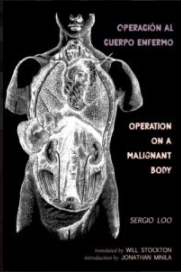
Operación Al Cuerpo Enfermo / Operation On A Malignant Body
“If any book has the ability to help us see beauty in a body abundant in transformations–from youthful health and vivacity seared with love and desire, to the slow intensification of decay and disorientation–as well as read and understand these changes through multiple linguistic iterations, Operation on a Malignant Body is it. Will Stockton’s renderings of Sergio Loo’s destabilizing poetry into English are just as challenging as the original Spanish: they diagnose prejudices about sexuality, illness, relationships and belief systems, to name only a few; they are risky in their resistance of melodrama, pity and simplifications; and they are sonically beautiful. This collection is resuscitating, prescribing an approach to how we can comprehend the body riddled with illnesses, both psychological and physical, how we can fathom the reality of illness as ‘a succession of language, ‘ because ‘Metastasis is synonymous with fear. And it spreads, ‘ just as a ‘body can reveal itself through tests, analysis, x-rays. Not the power of the doctors.’ The body across this book is a ‘contradiction’ between what is seen and from where: Loo reminds us that reality is the succession of language, ‘ and that those who care for us may know how our bodies function, but they do ‘not know what it wants.'” – Curtis Bauer, author of The Real Cause for Your Absence, translator of Jeannette L. Clariond’s Leve Sangre.
This dual-language Spanish-English collection of prose poems and diagrams leverages the late prolific queer Mexican poet Sergio Loo’s diagnosis with cancer (an Ewing’s Sarcoma in the left leg) to explore anatomical, linguistic, and social relationships between queerness and disability. With an introduction from Loo’s friend, Mexican writer Jonathan Minila.
De/Formations at the Margin: Body Beyond Metaphor: Thoughts on Sergio Loo’s Operación Al Cuerpo Enfermo / Operation on a Malignant Body, from translator Will Stockton
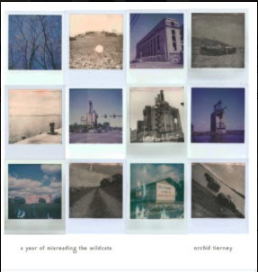
A Year of Misreading the Wildcats
wildcat: a boring, an aperture, an exploratory well.
“This book is evidence of unusually ebullient thinking about the spongy and interbred archives of petropolitics & necropolitics–life and death produced for/from the manna of fossil fuels–which Tierney parses, imbricates, and translates into poems that are wet and living, petrified and stony, made of paper and people, just like the range of archives she plumbs….This is a work of remarkable insight, confident tonal variance, and playful intelligence.” – Divya Victor, author of Kith
“This haunting and profound collection explores the traces of petroleum refineries, factories, landfills, train stations, nuclear power plants, and other sacrifice zones in the United States, Aotearoa (New Zealand), and the Pacific Islands. Throughout, Tierney creates an archive of oily verse, cut-up essays, textual collage, and actual polaroids to capture the elastic entanglements between ‘humans’ and the ‘planet, ‘ between ‘carbonauts’ and the ‘plastisphere.’ As companion readers, we are guided into the troubling ‘Urf’ and urged to discuss: Can poetry help us navigate unseen ecologies? Can poetry become a carbon sink? Can poetry metabolize the world so that we can continue to grow and love with ‘concussive tenderness’?” –Craig Santos Perez
‘a year of misreading the wildcats’ unravels a sprawling, year-long encounter with petroleum that began with a strip of plastic, caught between the branches of a maidenhair tree. This hybrid collection of poetry, prose and Polaroid photography drills the archive for film scores, fiction, and scholarship to recover the intertextual saturations of plastic and plankton, oil and oceans. Toggling between phantom islands and garbage gyres, the Pacific and Pennsylvania, a year of misreading the wildcats documents the impossible project of both environmental literature and photography to critique and catalogue disaster. This collection is a refusal for a narrative, where climate change denies the islands’ one.
An OS Interview with Orchid Tierney
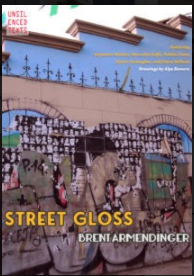
Street Gloss
“Street Gloss is a glory and a wonder. In it, Brent Armendinger serves both poet and translator, translating the role of the poet into something new and transformative. Five Argentine poets send Armendinger through the streets of Buenos Aires to retrieve echoes of redoubled meanings and double exposures. At the corner of Calle Bogotá and Calle Viamonte, from Plaza Lavalle to Estación Pichincha, at the corners of Combate de los Pozos and Humberto 1°, at the Parque Costanera Sur and elsewhere throughout the city, the poet translates the impulses of translation into astonishing prose poems. Armendinger unfolds translation itself into a somatic map of the city, he refracts his transect into a radiant witness, he delivers, from the city of Borges and Cortazar a city they’d recognize, a city that awakens within.” – Sesshu Foster, author of City of the Future
“In his second collection, Brent Armendinger refracts his translations of Argentinian poets through the lens of Buenos Aires residents who guide him into and around language in an exploded view of a collaborative translation, a polyphonic archive. In this formally inventive collection the translations are masterful, and the definitions that accompany them conjure a deeply-felt current of connection.” -Carmen Giménez Smith, author of Be Recorder and Cruel Futures
“Have you ever wondered what the translator was thinking while they were busy wondering what the poet they translated was thinking? I have, and these extraordinary uncompromisingly queer poems by Brent Armendinger are the answer. This brilliant somatic meta-form is my new favorite way to read translations.” -CAConrad, author of While Standing in Line for Death
In this experimental translingual work, Brent Armendinger follows the work of five contemporary Argentinian poets into the streets of Buenos Aires, attempting to map the ways a word might be an echo of the city itself. Interested in the surface areas of language and the generative potential of failure in translation, the author follows a set of procedures oriented simultaneously in the lines as well as in the streets of the city, gathering impressions, associations, and language through unpredictable encounters with the place and its inhabitants. Notes from these encounters appear interlaced, here, between the original poems in Spanish and their translations.
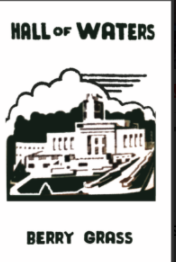
Hall of Waters
[A Kind* Texts & Projects Title]
Recommended by Ms. Magazine as an August 2019 featured title!
“To enter Berry Grass’ Hall of Waters is to agree to a deep-sea excavation through baths that are simultaneously familiar yet foreign. Grass is your guide–pen light in hand, illuminating darknesses that cause the light to refract back upon the reader and author. In Missouri, there are no natural lakes–instead, they are created by dam construction; the water cutting a swath through the trees. The springs, however, are believed to be true blue, as Grass says, ‘And it’s all so healthy, isn’t it? So restorative? To soak in our nature’s superior water and pretend that superiority is therefore our nature. To pretend that the concept of natural is natural.’ Hall of Waters is an examination of how America loves to be undisturbed after claiming what it believes to be theirs, and how Grass finds a way to reclaim identity while still carrying traces of the fountains of the past.”–Brian Oliu, author of So You Know It’s Me
“We forget that one product of fire’s burning is water. And Berry Grass’ searing and far-seeing, tetrahedral and tenderhearted micro memoirs set in the osmotic membrane of the Middle Border, Hall of Waters, re-minds us of these fused and confused outcomes at the core of the combustion of cognition. There is nothing I can think of akin to the elemental chemistry of this book. It is sublime, yes, but in its exquisitely rendered prose it rewrites (and rights) the valences that bond us to the place of place and the us of us. This water is ‘hard’ water indeed, but in the dissolved solids one finds a balm, a welling, a source, and a baptism all drenched and drenching in liquid fire.”–Michael Martone, Author of The Moon Over Wapakoneta and Brooding
HALL OF WATERS is an attempt to demythologize the rural American Midwest through the specific example of the author’s hometown, Excelsior Springs, MO. Through lyric essay & memoir, the book seeks to examine & undercut the inherent settler white supremacy of the Midwestern small-town, to deromanticize the nostalgia for land & place that is the hallmark of Midwestern art, & to think about what it was like growing up queer & trans in such a toxic environment.
Demythologized Ground: An OS Interview with Berry Grass.
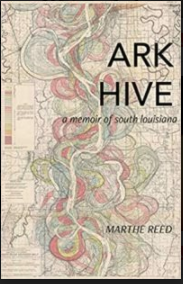
ARK HIVE
Exploring a tangled, unsettled love for place amid the landscape, cultures, and social and ecological crises of South Louisiana, ARK HIVE seeks amid the ruins for answers–what does it mean to be here, now? Following the ley-lines carved out in the streets and bayous of a rapidly eroding landscape, this collection refuses stability, confident of only the riddle and the manifold voices activating it. Reed’s formal hybridity juxtaposes hand-made maps, collaged language, and altered documents with lyrics and lyric essays: “fragments [from] journals, photographs, memory, archives–time capsule of a disintegrating world.” ARK HIVE bears its loves and dead along the current of the work’s own profligate vegetative urge–accretions of history and immersion, saturations of grief and delight. Tender and monumental, a teeming hive of voices, ARK HIVE returns an extraordinary, vanishing world to the center of our attention.
“There are locations–like Hawai’i, like Louisiana–where cultures are unique to the place, and outsiders are made to know themselves from insiders. As a poet familiar with issues of appropriation and theft, Marthe Reed asked herself how a Californian who had lived in Providence and Perth, could write about Louisiana, a place she loved over her many years of living in Lafayette. “Writing Louisiana, outsider-inside, poles of affection and alienation push and pull against me.” Her answer was to piece together an archive, and to write an epic from its documents: photographs, maps, names of birds, travel journals, histories, languages. What ultimately brings this material to life are the heart-lyrics stitched through the whole: from “threnody” “I keep the contents of my heart / stacked in wet clay / heavy with downpour,” where “behind the grate the small / eyes of an armadillo / muted reek / of urine and feces[.]” The threnody she wrote was for a beautiful, fraught, and fragile place. It grieves me to write my paragraph in the past tense. Shortly before she died she told me, “We’re all going to die and no one will remember us; it’s ok.” We are here to remember her and this ravishing, important, necessary work.” –Susan M. Schultz
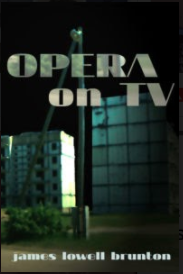
Opera on TV
“James Lowell Brunton’s Opera on TV reminds us that the most compelling works of formal and conceptual experimentation and innovation emerge not because of a self-indulgent quest for the “different” but because the complexity, challenge and unorthodoxy of the thoughts and feelings being explored demand complex formal ways to articulate the difficult. In this sense Brunton is extending the metaphor and simile, the construction of the line, and the limits of language to offer a work of emotional, intellectual and urgent cultural importance. These poems are at once disarmingly personal and alarmingly alert to our political and historical moment.” —Kwame Dawes
“James Lowell Brunton’s Opera on TV shows the poet questioning the value of and need for every genre of art in the 21st century. It’s a first book smart enough to be self-conscious about not knowing what the future holds for one who calls himself an artist: ‘I begin to grow dimly aware of myself and my limitations.’ In the midst of its conundrums the book turns to unashamed and philosophical love for the natural world: ‘We are often to be found looking out of windows.’ No matter the subject, the passion with which Brunton handles his obsessions makes each one of these poems a love poem.” —Jericho Brown
Opera on TV is a collection of experimental poetry/theory that examines the role of aesthetic practice in political subject formation, particularly for queer and trans subjects. The book addresses the role of state institutions and economic structures in making our lives intelligible — from our interpersonal relationships to our political identities and artistic endeavors. Many of the poems blend explorations of queer feminist aesthetics and politics with musicality and lyricism, in a variety of forms, such as prose blocks, lists, and transcripts. Drawing connections among themes of beauty, nostalgia, ideology, and liberation, Opera on TV suggests ways to complicate the notion of art as a mode of political education.
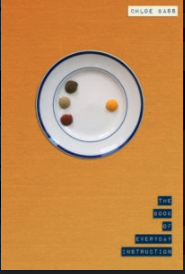
The Book of Everyday Instruction
“Instead of setting the stage for familiarity and comfort as politeness most often does, Bass’ announces the space in which she lets us know what she will and will not do for us. It is a smile that says, “No.”; It is the space in which she articulates her refusal to take control, to tell you what to think, to look for you, to, in a certain dramatically put sense, be “The Artist”; Which is not at all to say there is nothing to say, nothing to read or see – what there is is vast and infinitely specific and imbued with a rare intelligence and sentiment. But the only way you can see it is to take responsibility for your own seeing. To take responsibility for yourself as another singularity, a specific singularity bringing with it all the historical baggage that is positionality. Bass invites us to play a different game, one in which neither the rules nor we are familiar.” – Bill Dietz, “Politesse against the social”
In 2015, conceptual artist Chloë Bass began a two-year chronicle of one-on-one social interactions, beginning with the question “How do we know when we’re really together?” Through private performances, interactive experiences, text installations, interviews and photography, Bass explored the pair relationship, expanding ideas of place, history, activity, and distance. In developing the project, Bass conceptualized the book as an exhibit; now, in collaboration with The Operating System, she presents an exhibit as a book.
Increasing the Scale of the Intimate – an OS conversation with Chloë Bass
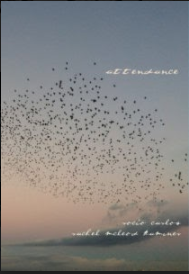
Attendance
“Attendance is a meditation, an ushering-in of the kind of mindfulness that life deserves. One that leaves readers like me nodding and saying yes to lines like these: ‘Just try to want different things’ and ‘You can do anything you want with me as long as you do it slowly first.’ Carlos and Kaminer are power, and this book is plain gorgeous.”
–Natashia Deón, author of Grace
“I expected to be moved by this collaborative work from Rachel McLeod Kaminer and Rocío Carlos–they are two distinct and beautiful poets after all. But what I didn’t expect from Attendance is the way it brought the life around me to life. How the birds and the trees and the landscape began to move in ways I hadn’t noticed before, how my skin began to feel enveloped by the details of the day. Great art has always made me know that I belonged in the world, that I wasn’t wandering through it alone. And Attendance, as much as any recent book, has reminded me of this truth.”
–Chiwan Choi, author of The Yellow House
“what can we actually unlearn? capitalism is cellular where birdsound is molecular? shall we abandon the impulse to overtake? shall we slough of layers of administration to expose the medular hollow? where might we rest our heads?”
–jen hofer, from ‘an after attendance’
———————
Reading Attendance trains your attention on plants and animals until you can’t stop noticing them. It’s a way of moving through the natural world–which turns out to include the whole world. An almanac, a logbook, a devotional, a witness statement, poetry. A documentary not in the sense of capturing but in the sense of being a creature paying attention to the world we already live in. It’s a hybrid text: One year of two people reaching their arms across styles and genres. At times notes, at times lists, or run-on sentences, or poems, or things that want to be poems, but always plants, and always animals. The words are offered up with no correction or with the revision exposed. This is writing that includes where it comes from or writing that painfully doesn’t become.
We hold so many questions about love and attention and violence.
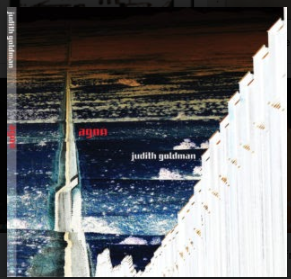
agon
“The Commodification of Everything. That was the pivot point of materialist discourse not even five years ago. But now, it’s time to crack open the piths of the most fundamental doings of our species. After the sweeping tide of ethnonational victories currently sweeping the globe, The Weaponization of Everything, is not merely the ‘speak’ of The Now, but the do of all its subjects, whether collusive or rebellious. Judith Goldman’s AGON is borne amidst this new reality. Few works of experimental literature aim so high as to flush out the full range affectual coordinates as to reveal their age’s Agon as a controlling demigod of our own making, that is, to raise up the Agon’s ‘agon’.”–Rodrigo Toscano
“Judith Goldman’s AGON confronts the ubiquitous naturalization inherent in the weaponization of race, gender, global warming, poetics, language, utterance, politics, torture, immigration, and whatever else is changeable under the guise of aggression masquerading as mental freedom. ‘…the intensification of weapons already in place, ‘ and ‘…observed nearly everywhere, ‘ AGON deftly solders ideas of defensive assimilation (weapons already in place) to our conscious and unconscious activities of daily living. One can only bow down in shock and awe to AGON’s scorched earth dissemination of open-ended spaces to think, while thinking is still, hopefully, under what we presume is our jurisdiction.”–Kim Rosenfield
A cross-genre work that intercuts and assembles three textual threads, AGON inventories ubiquitous contemporary exempla of weaponization: in the culture propagated by neoliberalism, all social forms–ordinary, necessary relations, transactions, and communications–have been turned into fodder for social aggression. AGON audits the disavowed violence of abstractive technologies in their material effects, while also tracing the subtle anatomy of violence in its more “proper” spheres. Is poetry one of these? Writing alongside Amiri Baraka’s invective “Black Art,” AGON builds a dossier on the aggressivity peculiar to literary speech, thinking this issue in relation to the volatile politics around poetry in America at this moment.
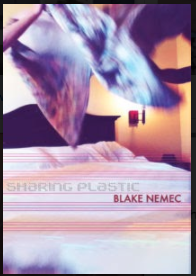
Sharing Plastic
“‘By the fear in her face I don’t think she knows realness, ‘ writes Blake Nemec in his disarmingly original book Sharing Plastic. And what’s real here is the “banter” of sex and hotel workers that in spectacular glimpses reveals their behind-the-scene intimacies and the endless negotiations needed to get paid, stay alive, and avoid arrest. The specter of violence always at the margins of their swagger and wit, we listen to them as they arrange their ‘bodies of work’ in latex, or assemble pillows on beds (because ‘pillows are my paycheck’), as they discuss how to ‘organize dating’ while on a wine-tasting tour, or urge a co-worker troubled by a John who looks like Brad Pitt to ‘pretend he was Judith Butler.’ Smart and funny, Nemec’s debut book of poetry shows us that ‘talk is rope, ‘ that individual voices find their strength braided together in common purpose. I urge you to listen.”–Rosa Alcalá
“Reading a blake nemec book you realize what people must have felt after a month or two in Warhol’s Silver Factory–simultaneously the multimedia blitz, the making of a dozen different movies around you, the pillows of silver mylar floating through air, the silkscreened flowers, and the soul-shattering buzz of being in the most exciting place on earth. Puzzling, but definitely thrilling. nemec’s work is filled with stories and dialogue, but also analytic passages that combine raw bioenergy with Noel Coward wit. And so sexy! “Their torsos/ / swooshed past each other’s/ images, but bent towards one another’s mouths lipping off….” This broken mess of exquisite diamond dust, this altar of soul and desire, will give God a new face.” – Kevin Killian
——————————
Sharing Plastic is a gushing homage to each worker who has feared arrest. It is a confrontation to an undiscerning view of migration and whiteness. At times playful while others severe, this hybrid poetry/fiction collection works to lengthen sonic intimacies between unprotected workers by snaking such dialogues or scenarios next to one another as one resonating force.
Different from literature that finds poetic tension between informal trade workers and their bosses, or poems that distantly paint a marginalized worker scenario as dramatic, these episodes hone in on the loving or volatile worker to worker exchanges.
The characters and voices in these vignettes cinematically traverse between El Paso, San Francisco, Oakland and Chicago. In a political time when people are bracing themselves each time they turn on the news, Sharing Plastic, alongside other voices which only know flux, suggests honoring those who have long known how to navigate the temporary.
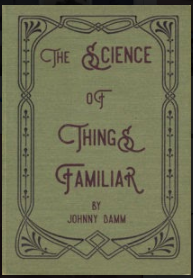
The Science of Things Familiar
“Johnny Damm’s Science of Things Familiar diagrams the ways we move toward and away from one another, exploring relationship through the failures and disjuncts that reveal it. In annotated illustrations taken out of their original context, in comics stripped of their narrative content, and in cinematic essays whose parts are sutured where they’ve been spliced, these pieces take apart the familiar to see what makes it tick. Troubling our assumptions about the workings of nonfiction, they reveal themselves as highly constructed, interweaving the personal and historical just as the book’s “rat-a-tat” refrain rings out both drumbeat and gunfire. If we catch ourselves dancing, we’ve missed the point. Witty and serious, critical and compassionate, Damm invents a new visual poetics in which what we see and hear do not sync up. This is his way of waking us up with a “BLAM!” and “WHOOSH!” to the history of appropriation and conquest underlying America’s popular forms. Nothing here is familiar, even as we recognize parts of the whole.” – Amaranth Borsuk
Herman Melville performing jumping jacks. An experimental Brazilian filmmaker making British propaganda films. A legendary delta bluesman who prefers to play the pop hits of the day. In Science of Things Familiar, Johnny Damm sifts through cultural detritus to disturb the sleeping past. In an uncategorizable mix of image and text, Science of Things Familiar scavenges from 50’s pulp comics, 19th century scientific diagrams, film noir shooting scripts, and more. Damm introduces the reader to an American landscape of bastard blendings, where the familiar swiftly gives way to the uncanny.
—
A Farm of Mismatched Parts | Getting Familiar with Johnny Damm :: An OS [re:con]versation
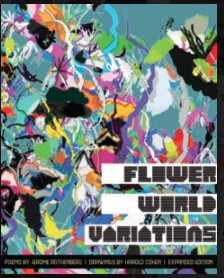
Flower World Variations
As part of the Glossarium: Unsilenced Texts series, The OS presents FLOWER WORLD VARIATIONS, a revised and expanded version of Jerome Rothenberg’s variations on a set of traditional Yaqui Indian Deer Dance songs, with computer-generated drawings by Harold Cohen, one of our truly great pioneer computer artists. Originally published in a modest 1984 offset edition the book is newly enhanced in quality and features an updated introduction by Rothenberg and an excerpt from Cohen’s writings on the nature of mark-making and meaning/metaphor over a wide range of times and cultures. As such it serves also as a memorial and tribute to Harold Cohen, whose recent passing it helps to commemorate.
“The process of translation is here re-imagined as a new wilderness by Jerome Rothenberg and Harold Cohen, in a multilayered composition of poems and computer generated drawings for the ‘human / other-than-human worlds’ originally composed by the Yaqui poets of Arizona. An oral masterpiece, rendered masterfully. A moment to rejoice!”—Cecilia Vicuña
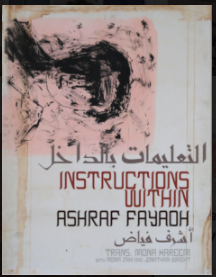
Instructions Within
Translated from the Arabic by Mona Kareem, with Mona Zaki, and Jonathan Wright; and with Ammiel Alcalay, Pierre Joris and Lynne DeSilva-Johnson assisting/editing. Longlisted for the Best Translated Book Award for poetry.
The Operating System is honored to publish the first Arabic-English full translation of Ashraf Fayadh’s singular volume of poetry, INSTRUCTIONS WITHIN, which was published by the Beirut- based Dar al-Farabi in 2008 and later banned from distribution in Saudi Arabia. This special edition includes two paintings by Ashraf Fayadh on its front and back covers, and is right bound, asking the reader to consider their estrangement from Arabic language, literature, and life, inviting a new relationship to begin to form. The Operating System will donate proceeds from sales of this book to support Fayadh’s ongoing case for his release from imprisonment for apostasy as a response to these very verses in Saudi Arabia.
“Why do you need to read this book in America today? Because a US journalist asked if it really was worth it to write poems that might get you killed. Because Ashraf Fayadh, as poet, artist and human being, is being jailed and tortured for doing his job, that is for daring to expose & deride the two-headed Moloch governing the country he lives in (Saudi Arabia) and ours (these States): Fundamentalist religion & oil-money. Because Ashraf Fayadh is inventing a needed poetics to break not only those taboos but also the shackles of standard Arab poetics, freeing the language–& a freed language is needed for free thinking. Because his own exile (he is of Palestinian extraction) is so absolute that it does not fit the traditional nostalgic poetics of exile & searches for a new way of saying a new & wilder dislocation. Because this exile is so close to all of our own dislocations, even as, smugly ensconced in our North American bunker, we don’t see that the same future is awaiting us. Because he wrote: ‘I am Hell’s experiment on planet Earth.’”–Pierre Joris
“Just a few years before his death, the great poet Amiri Baraka railed against what he saw as a poetry of complacency, of ‘the indoors, ‘ and harkened back to those of his generation (and older), ‘who actually worked to register some understanding of ‘the great outdoors’ i.e., the real world.’ It is with more than some irony that we here, in the belly of the imperial beast, must seek such poetry of ‘the great outdoors’ from someone like Ashraf Fayadh, a Palestinian imprisoned in Saudi Arabia. Like the real world, Fayadh’s poems are dizzying in their associations and resonance, recalling echoes of lines from different times, languages, and circumstances, from revery to exile, from brutality to utmost tenderness. Poet and artist Etel Adnan once wrote that ‘Palestine is a land planted / by eyes refusing to be closed.’ The poetry of Ashraf Fayadh, in a dream state of vigilance, attention, and horror, forces us to look at the world we actually inhabit, in all its glory and horror.”–Ammiel Alcalay

Say/Mirror
2016 Lambda Literary Award for Lesbian Poetry, Finalist. JP Howard’s debut collection, SAY/MIRROR, is a dialogue of history and memory, reflecting on and integrating vintage photographs of her mother, Ruth King (a fairly well known African American runway model in Harlem during the 1940’s and 1950’s) with snapshots from the poet’s own childhood. This manuscript began to emerge when Howard gained access to a large collection of her mother’s modeling photos, as well as some local Harlem magazine and newspaper clippings, and was thereby offered a window into her heyday, begging comparison to and recollection of a complex motherhood away from the spotlight. Here is a project that seeks to use poetry as both memoir and biography, alongside the evocative nostalgia of vintage image a map from which Howard has pieced together the bright but uneven path of growing up in the shadow of a “model” mother. The atlas of SAY/MIRROR charts the islands of the poet and her mother’s overlapping lives unearthing the shared experiences of a single parent and only child, coming to terms with each other in the 1970’s and 80’s: a socio-historical-emotional retelling of the life of a diva through a daughter’s eyes, with both parent and child learning to navigate the rocky terrain therein.
“JP Howard’s collection of poems is a raw reminder of the experience of motherhood and daughterhood. Her sharp memories of love and neglect; elegance, admiration and inadequacy leave a salty/sweet taste not soon forgotten.” Jewelle Gomez
“Juliet P. Howard’s porcelain collection of daughter memoirs is enough to break into you like fine China the shadow of her legacy hovering just above diva, the tenderness of grief stained just below doll.” Anastacia Tolbert
“Praise Juliet Howard for the wonderful ability to bring to life a mother whose beauty, seduction and danger challenge the notions of a young girl growing up in her shadow. SAY/MIRROR manages to capture with sharp detail and lively resonant language the elegance and ambivalence of the poet’s mother and her world. These poems evoke images of passion and loss, pain and joy. We must all stand up and applaud the poem ‘pushing her way to the surface… her shape on the page as she unfolds.'” Pamela L. Laskin
“JP Howard stands out both for her fine poetry and for her passionate, unrelenting involvement with and on behalf of lesbians of color, all lesbians, and the LGBTQ literary community. She reverently celebrates our forebears. A poet, a teacher, and a curator, Ms. Howard has shown an ongoing commitment to nurturing our writers and to writing and publishing from her heart.” Lambda Literary Award judges Reginald Harris and Lee Lynch”
